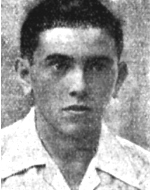Shalom, son of Tova and Dov, was born on January 1, 1925 in Poland, in the town of Bialowrzeg in the province of Kielce, near Radom, received a traditional education and was active in the Torah v’Avodah movement. The world’s major religious, national, political, social, and cultural spheres, had a population of about 3.5 million, and the severe economic crisis of the late 1930s influenced the agriculture of Poland and exacerbated the anti-Semitic sentiments of the Jews, In economic life, they suffered from an anti-Jewish economic boycott and growing pogroms on September 1 1939 World War II broke out with the German invasion of Poland and its conquest during the lightning war (“Blitzkrieg”) Immediately afterwards, anti-Jewish decrees and regulations were published that resulted in the social isolation of the Jews, their economic deprivation and the undermining of their entire life. The ghetto was active until 1942, and many refugees from other places were concentrated there, and on October 1, 1942, the ghetto’s inhabitants were deported to the Treblinka extermination camp, where most of them perished. When the war broke out, Shalom’s father died. His mother and entire family were taken by the Nazis to the crematoria. He himself was taken to a labor camp in Germany, from where he was sent to Auschwitz and Majdanek but miraculously survived. Shalom managed to escape from the concentration camp and joined the partisans in the Polish forests. He lived as a partisan and fought the Nazis as much as he could until the end of World War II. After the liberation he joined “Youth Aliyah”. In 1946 he immigrated to Israel from France, and for more than a year lived in a boarding school of Agudath Israel. After he was forced to live as a Pole in the war, the fire of the Jewish religion burned him, and he prayed with great devotion. After his stay at the boarding school, he moved to Petah Tikva, earning his living as a laborer. At the outbreak of the War of Independence, Shalom enlisted in the Haganah and served in the religious company of Battalion 33 in the Alexandroni Brigade. He participated in many activities, including the battle for Tel Litvinsky and the battle for the conquest of Tantura. He was usually a departmental runner, and he was very fond of his friends and commanders. Shalom’s goal was to establish a religious unit in the commando or paratroopers, and throughout his service he continued to request a transfer there. In December 1948, he fought peace in the south, in Iraq al-Manshiyya. As part of Operation Horev for the liberation of the Negev, it was decided to carry out a “liquidation” operation against the “Faluja pocket” in the south (near the Flugat junction), where an Egyptian brigade was besieged. The attack took place on the eastern flank of the “pocket” in the area of Iraq al-Manshiya, an Arab village located near Tel Irani, not far from present-day Kiryat Gat. On December 28, 1948, Alexandroni forces broke into the village from the south and took control of part of it, but their assault on the hill north of the village was repulsed. Meanwhile, the Egyptians recovered, launched a counterattack, and forced our forces to retreat. Shalom, despite being wounded, continued to fire until he fell. With him fell close to ninety fighters of the company. He was twenty-four years old. Shalom and his friends were buried there by the Egyptians, and shortly afterwards were brought to rest in the Nahalat Yitzhak military cemetery. At the western entrance to Kiryat Gat, a monument was erected to commemorate the 87 fallen in this battle, the “last scion.” The last survivor of the Holocaust is a survivor of the last surviving nuclear family (parents, brothers, sisters, sons and daughters) The Holocaust in the ghettos and / or concentration and extermination camps and / or in flight and hiding in the territories occupied by the Nazis and / or fighting alongside members of the underground or partisans in the Nazi occupied territoriesWho immigrated to Israel during or after World War II, wore uniforms and fell in the Israeli army.
